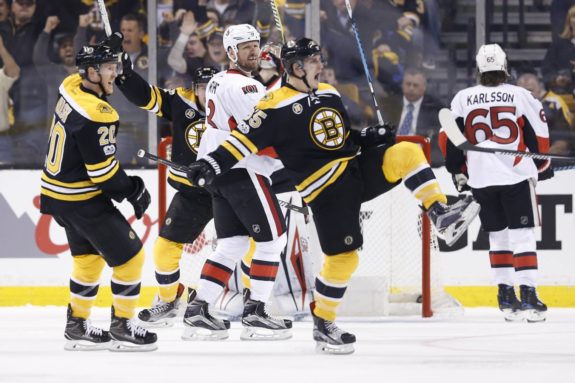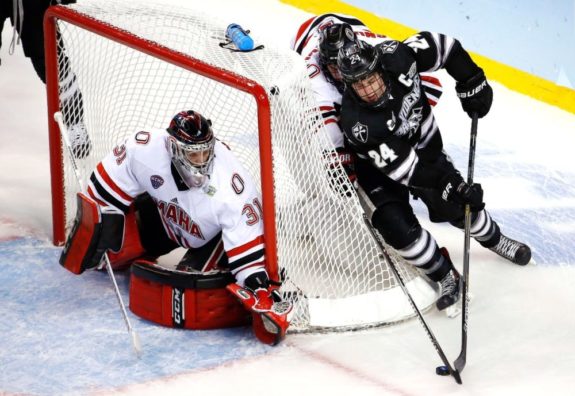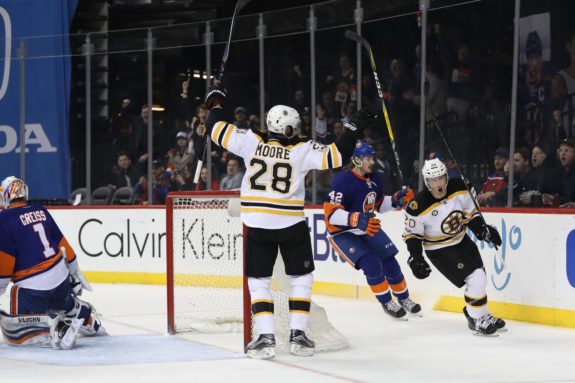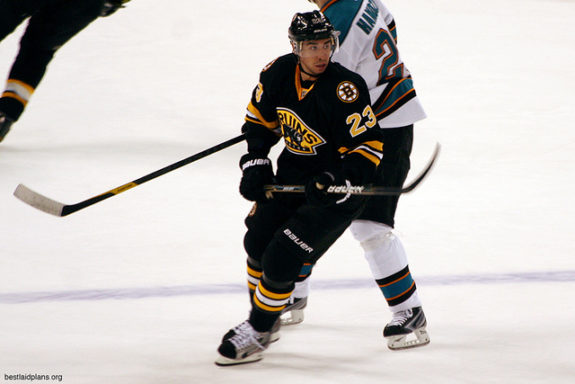The Boston Bruins can scratch one restricted free agent off of their “To Do” list.
Noel Acciari inked a two-year, one way contract with the Bruins on Wednesday, and though his re-signing with the club likely raised few (if any) eyebrows, the salary and nature of the deal are a pleasant surprise. His $725,000 cap hit actually serves as a $70,000 decrease in pay from his recently-concluded entry level contract.

This pay cut can be attributed to the one-way nature of his new deal. It would appear that Acciari was willing to leave a little money on the table to ensure that bus rides and a “Spoked-P” on his chest became a thing of his past.
With $12.7 million in cap space following his signing, the Bruins can now turn their attention elsewhere. Acciari meanwhile can put contract worries to rest and begin preparing for next season an NHL regular. That’s a win-win.
Stability for Acciari
As mentioned above, what the contract lacks in dollars it makes up for with stability. With Riley Nash firmly entrenched on the team’s fourth line, Acciari, Sean Kuraly, Tim Schaller, Matt Beleskey, Anton Blidh and, as of now, Jimmy Hayes are all competing for spots as bottom six grinders and a spare forward for the Bruins. Beyond the grinders, Austin Czarnik, Jake DeBrusk, Danton Heinen, Peter Cehlarik and Anders Bjork will be looking to lock-down roles somewhere in Boston’s lineup.
A handful of the aforementioned players will at least begin the year in Providence. Acciari’s new one-way contract ensures that he is not one of them.
Furthermore, the Johnston, Rhode Island native and former Providence Friar gets to stay close to home, playing for the team he grew up cheering for. That in and of itself is worth leaving some money on the table.

The deal also extends beyond the borders of team control. When his contract expires following the 2018-19 season he will have the opportunity to test unrestricted free agency; he’ll be 27 years old and likely in better position for a pay day.
Stability for Bruins
The organization itself is an even bigger winner following the signing. The five-foot-eleven, 205 pounder is a plug-and-play grinder, capable of playing both center and wing. His straight-line, no-nonsense style and propensity to throw his body around are tailor-made for the fourth line. His forecheck is relentless, and he can be counted on to kill penalties as well; a trait that will be in demand following Dominic Moore’s likely departure.

Offensively, he won’t ever be relied on to fill the net with pucks, but things did start to click for him as last season wound down. After going scoreless through his first 42 NHL games, he scored twice in a span of five days in games 76 and 78 of the season.
After missing the first two games of Boston’s first round series versus Ottawa he connected again. His pretty deflection of a JM Liles shot sparked a three-goal comeback for the B’s, prior to the team falling in overtime. He followed that up by having his overtime winner in Game 5 waved-off with a very questionable call. Had the goal stood it would have been his fourth in nine games.
Goals will always be the cherry-on-top for Acciari. However, his production down the stretch and 33 points in 75 AHL games suggest he’s not a black hole either.
Maneuverability for Bruins
With all due respect to Acciari, the Bruins have bigger fish to fry this offseason.
From a David Pastrnak extension to addressing needs in the top six and on defense, money is at a premium. Though Acciari was never going to break the bank, every dollar counts in this league. An extra hundred-thousand dollars here and there adds up, and can be the difference between being able to fit a player under the cap and not being able to.
If the Peter Chiarelli era taught us anything, it’s this: Don’t overspend for role players. Chris Kelly turned an anomalous 20-goal campaign into $3 million per year for four years. Rich Peverley signed for three years at $3.25 million annually that same offseason.

Both were solid contributors for the Bruins (and Kelly was an exemplary leader), but that’s still over $6 million per season spent on third line players aged 30 or older at the time of their signing. That’s not money well-spent.
Fast-forward two years from those signings and Boston is unable to come up with the cash necessary to re-sign Johnny Boychuk. He’s shipped to the Islanders for two second-round picks, and the unraveling of Boston’s blue line begins.
Money adds up in this league, and quickly at that. Using a one-way deal to knock $100,000-$175,000 off of Acciari’s price tag is shrewd negotiating from GM Don Sweeney.
Moving Forward
With the energy forward officially back in the fold, the front office can turn its attention elsewhere. They can now better prepare for unrestricted free agency, which kicks off on July 1. They have a sightly-clearer picture for determining which potential free agents or trade targets make for a good fit.
David Pastrnak’s extension will surely take up a large chunk of the remaining cap space. However, the surprising affordability of Acciari’s new deal will leave a few extra dollars to be dispensed elsewhere.
Acciari himself is now guaranteed a spot among Boston’s 13 forwards. He no longer has to think about dollars and cents, nor will he be hearing footsteps from Boston’s bevy of fourth line candidates. He can focus on preparing for the season, and building upon the success he attained at the end of last season.
Everybody wins.